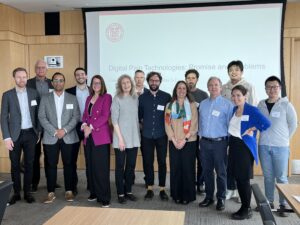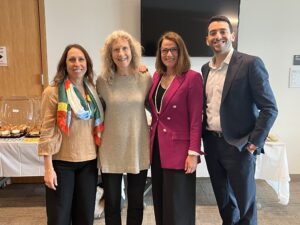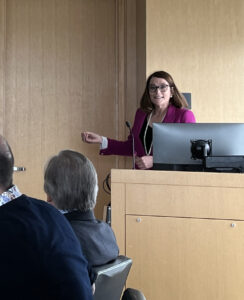Advocating for Person-Centered Pain Care During Cornell Workshop

The Alliance to Advance Comprehensive Integrative Pain Management (AACIPM) and National Pain Advocacy Center (NPAC) extend sincere gratitude to Cornell University for hosting an extremely timely and important workshop, Digital Pain Technologies: Promises and Problems, from May 1-2, 2023. Organized by Cornell’s Benjamin Lipp and Stephen Hilgartner from the department of Science & Technology Studies, the workshop brought together academics from social science and technical disciplines, along with health professionals, patient advocates, and companies, around the issue of designing systems of pain management that are more equitable, accessible, and integrated.
 Current and converging trends in pain management include an abundance of new and emerging digital interventions, and this raises many questions when thinking about person-centered pain management. These include and often combine digital applications that monitor pain symptoms and behaviors, new generations of wearable neuromodulation devices, as well as telehealth platforms. Next to pain relief, these technologies share the goals of empowering patients outside the clinic, providing better access to care especially in rural areas, and offering new kinds of data to providers as well as patients. However, while there are many success stories and promising products, their prospective integration into new systems of pain management raises a range of ethical, political, and technical questions, such as:
Current and converging trends in pain management include an abundance of new and emerging digital interventions, and this raises many questions when thinking about person-centered pain management. These include and often combine digital applications that monitor pain symptoms and behaviors, new generations of wearable neuromodulation devices, as well as telehealth platforms. Next to pain relief, these technologies share the goals of empowering patients outside the clinic, providing better access to care especially in rural areas, and offering new kinds of data to providers as well as patients. However, while there are many success stories and promising products, their prospective integration into new systems of pain management raises a range of ethical, political, and technical questions, such as:
- How does the availability of digital pain data impact communication between patient and provider?
- Whose claims about pain does digital pain data harness and whose do they discredit?
- What new kinds of vulnerabilities emerge at the device-body interface, such as data leakages or safety issues?
- Does digital integration make pain management more accessible or produce new inequities?
 Among a select group of 15 experts, NPAC Director Kate Nicholson, JD, and AACIPM Director Amy Goldstein, MSW, were invited to add to the workshop’s trans-disciplinary dialogue. While having time together in Ithaca, we decided to co-write this blog to be efficient and help build momentum more broadly. Kate presented Equity, Access & Privacy in Remote Care: Pitfalls and Opportunities; Amy presented Unpacking equitable, whole person, multimodal pain care in the context of responsible, real-world solutions.
Among a select group of 15 experts, NPAC Director Kate Nicholson, JD, and AACIPM Director Amy Goldstein, MSW, were invited to add to the workshop’s trans-disciplinary dialogue. While having time together in Ithaca, we decided to co-write this blog to be efficient and help build momentum more broadly. Kate presented Equity, Access & Privacy in Remote Care: Pitfalls and Opportunities; Amy presented Unpacking equitable, whole person, multimodal pain care in the context of responsible, real-world solutions.
Other participants raised a number of other ethical, policy, and digital concerns that made participants reflect on digital interventions from a more nuanced viewpoint. The collective interest in this workshop was palpably strong and, by workshop’s end, there was unanimous support in participating in next steps, such as a joint statement from the participants and a follow-on meeting.
About her time at the workshop, Amy Goldstein, Director, AACIPM said:
“I am so enthusiastic about the next steps after participating in this workshop! We covered a lot of ground among leaders who sincerely wanted to listen, discuss, and learn from other experts – all to focus on designing responsible systems of pain management that are more equitable, accessible, and integrated. We want to build momentum by continuing to connect more dots.”
Scholarship Recipients to UVM Integrative Pain Management Conference Learn to Implement, and Bill For, Integrative Pain Care

 This month, AACIPM partnered with IM4US and the University of Vermont to offer scholarships to providers caring for the underserved to attend the Integrative Pain Management Conference presented by the Osher Center for Integrative Health at UVM. Through this partnership, we were able to help 35 multidisciplinary practitioners at various stages of their careers to attend this conference. A few of the conference highlights include:
This month, AACIPM partnered with IM4US and the University of Vermont to offer scholarships to providers caring for the underserved to attend the Integrative Pain Management Conference presented by the Osher Center for Integrative Health at UVM. Through this partnership, we were able to help 35 multidisciplinary practitioners at various stages of their careers to attend this conference. A few of the conference highlights include:
- A deeply moving presentation from Carmen Green, MD, Dean at CUNY School of Medicine. Dr. Green spoke from her heart about The Genesis of the Unequal Burden of Pain: A Selective Review of Examining Social Inequities and Unheard Voices.
- A case presentation from the phenomenal team at UVM’s Comprehensive Pain Program, which included the perspective from a current participant, John R. Killacky. We were awed listening to his experience in the program which has given him a feeling of pain relief unlike anything he’s known for many years. Read more in his article in VT Digger.
 A fireside chat, Building the Case for a Value-Based Approach to Low Back Pain, with Marion Couch, MD, PhD, MBA and Christine Goertz, DC, PhD. Their collective experience from the payor, research and provider realms made for a rich and provocative discussion.
A fireside chat, Building the Case for a Value-Based Approach to Low Back Pain, with Marion Couch, MD, PhD, MBA and Christine Goertz, DC, PhD. Their collective experience from the payor, research and provider realms made for a rich and provocative discussion.- Scarlet Soriano, MD, Executive Director, Duke Health and Well-Being, truly dazzled people in her closing presentation on Connecting with Self, about the intersection of science and spirituality. Her unparalleled energy and positivity were next-level and inspiring.
- An eye-opening presentation by Yoni Ashar, PhD, Clinical Psychologist, Neuroscientist, as he talked about New Approaches in Chronic Pain Diagnosis and Treatment: A Pain Reprocessing Therapy Perspective.
In a post-conference survey of scholarship recipients, 100% of currently-practicing health professional respondents reported gaining new tools and insights as a result of attending the conference, and 79% believe that, since attending, their opinion has changed regarding their role in the comprehensive treatment of their patients seeking pain management.
One provider, Mona Flyn, a yoga therapist working in private practice, shared some very exciting feedback with us about the ripple effect of this scholarship:
I just wanted to thank you for this opportunity! I attended this conference in 2021 as a first year doctoral student looking to glean information that would help me in the long run with the community engagement program that I started five years ago, The Yoga Connection. We are just over a year as an official 501(c)(3), providing free yoga therapy to immigrant and refugee women. Our greatest challenge is the language barrier, and this summer I am going to create an evidence-based trauma-sensitive training for the teachers. Though the teachers are certified, it will be ideal to provide this layer of training and to include information that incorporates sensitivity to pain. As a yoga therapist for over 30 years and a trauma specialist for over 12 years, I realize the value of mind-body modalities and respect the unique situation of each person – we are always learning, for the sake of serving.
Another participant, Laura Calascione-Nguyen, NBC-HWC, discussed what changed for her after attending this conference, bringing an important viewpoint to light:
While I am an Allied Health Professional, I am first a patient with lived experience. Knowing how impactful an informed care team has been for me, I was not seeing comprehensive pain programs where clients were located. So, I don’t feel like what I knew “changed” after attending this conference, but I can now point to demonstrated examples as I talk with other patients and providers and try to make an impact in the areas I can influence.
 In addition to learning about the benefits of team-based and patient-centered care, attendees learned about the options available for billing and reimbursement related to such care. Yolanda Cardenas, a physician working at a Federally Qualified Health Center, who believes that insurance coverage for services and providers for chronic pain management is one of the biggest challenges that she and her patients face, found the conference to be helpful because it helped providers to understand how to bill properly in order to have pain management services covered and reimbursed. Diane Robinson, a Neuropsychologist who directs the Cancer Support Community and implementation of integrative care at the Orlando Health Cancer Institute, agreed with Cardenas, finding that the conference provided attendees with information related to billing and staffing for non-pharmaceutical options.
In addition to learning about the benefits of team-based and patient-centered care, attendees learned about the options available for billing and reimbursement related to such care. Yolanda Cardenas, a physician working at a Federally Qualified Health Center, who believes that insurance coverage for services and providers for chronic pain management is one of the biggest challenges that she and her patients face, found the conference to be helpful because it helped providers to understand how to bill properly in order to have pain management services covered and reimbursed. Diane Robinson, a Neuropsychologist who directs the Cancer Support Community and implementation of integrative care at the Orlando Health Cancer Institute, agreed with Cardenas, finding that the conference provided attendees with information related to billing and staffing for non-pharmaceutical options.
AACIPM values this ongoing collaboration with UVM and IM4US to help grow the integrative care workforce by helping to educate and inspire 35 multidisciplinary professionals around integrative pain management. We look forward to more opportunities to grow the integrative health workforce in response to the needs in all our communities.
National Updates
Bill to Allow Licensed Acupuncturists to be Medicare Providers Introduced in House
 On May 9, Reps. Judy Chu (CA-28) and Brian Fitzpatrick (PA-01) introduced the Acupuncture for Our Seniors Act of 2023. The Acupuncture for Our Seniors Act would increase access to acupuncture in the US healthcare system by ensuring that licensed acupuncturists can participate as providers in Medicare. While Medicare has already acknowledged the value of acupuncture by issuing a National Coverage Determination for chronic lower back pain, licensed acupuncturists are still prohibited from being Medicare providers.
On May 9, Reps. Judy Chu (CA-28) and Brian Fitzpatrick (PA-01) introduced the Acupuncture for Our Seniors Act of 2023. The Acupuncture for Our Seniors Act would increase access to acupuncture in the US healthcare system by ensuring that licensed acupuncturists can participate as providers in Medicare. While Medicare has already acknowledged the value of acupuncture by issuing a National Coverage Determination for chronic lower back pain, licensed acupuncturists are still prohibited from being Medicare providers.
According to Rep. Chu, “Acupuncture treatment should be available to all Americans, and this bill moves us closer to this goal by connecting more Americans to the care they need, and ensuring we are giving our seniors on Medicare access to all available treatment options.”
The bill has been referred to the Committee on Energy and Commerce, and in addition to the Committee on Ways and Means, for further consideration.
COVID-era Telehealth Rules for Prescribing Controlled Substances Extended by DEA
 During the COVID-19 public health emergency, authorized providers have been able to prescribe controlled substances via telehealth under certain circumstances. This included: (1) prescribing a controlled substance to a patient using telemedicine, even if the patient isn’t at a hospital or clinic registered with the DEA, and (2) prescribing buprenorphine to new and existing patients with opioid use disorder based on a telephone evaluation. While the public health emergency expired on May 11, the Drug Enforcement Administration (DEA), along with the Substance Abuse and Mental Health Services Administration (SAMHSA), issued a temporary rule to allow the following:
During the COVID-19 public health emergency, authorized providers have been able to prescribe controlled substances via telehealth under certain circumstances. This included: (1) prescribing a controlled substance to a patient using telemedicine, even if the patient isn’t at a hospital or clinic registered with the DEA, and (2) prescribing buprenorphine to new and existing patients with opioid use disorder based on a telephone evaluation. While the public health emergency expired on May 11, the Drug Enforcement Administration (DEA), along with the Substance Abuse and Mental Health Services Administration (SAMHSA), issued a temporary rule to allow the following:
- All telemedicine flexibilities regarding prescription of controlled medications as were in place during the COVID-19 public health emergency will remain in place through November 11, 2023.
- For any practitioner-patient telemedicine relationships that have been or will be established on or before November 11, 2023, all telemedicine flexibilities regarding prescription of controlled medications as were in place during the COVID-19 public health emergency will continue to be permitted through November 11, 2024.
PCORI and AHRQ to Develop Systematic Review on Peripheral Nerve Blocks for Postoperative Pain Management
 The Patient-Centered Outcomes Research Institute (PCORI) is partnering with the Agency for Healthcare Research and Quality (AHRQ) to develop a systematic evidence
The Patient-Centered Outcomes Research Institute (PCORI) is partnering with the Agency for Healthcare Research and Quality (AHRQ) to develop a systematic evidence  review on Peripheral Nerve Blocks for Postoperative Pain Management. From May 1-19, AHRQ accepted public comment in regard to a draft key question regarding surgical patients, seeking information on the effectiveness, comparative effectiveness, and harms of peripheral nerve blocks for managing postoperative pain and its sequelae (including opioid use), and how findings vary due to a patient’s clinical or demographic characteristics, provider characteristics, and clinical setting. This review is in its early stages, and this was just an initial public comment period regarding a draft question—there should be an additional comment period regarding more specific and/or additional questions as the study progresses.
review on Peripheral Nerve Blocks for Postoperative Pain Management. From May 1-19, AHRQ accepted public comment in regard to a draft key question regarding surgical patients, seeking information on the effectiveness, comparative effectiveness, and harms of peripheral nerve blocks for managing postoperative pain and its sequelae (including opioid use), and how findings vary due to a patient’s clinical or demographic characteristics, provider characteristics, and clinical setting. This review is in its early stages, and this was just an initial public comment period regarding a draft question—there should be an additional comment period regarding more specific and/or additional questions as the study progresses.
More Veterans Gain Access to CBT for Pain via Expanded Program
 Based on positive early findings in nine VA pilot sites across the country, the “Cooperative Pain Education and Self-management” program (COPES program) is being expanded into New England in 2024.
Based on positive early findings in nine VA pilot sites across the country, the “Cooperative Pain Education and Self-management” program (COPES program) is being expanded into New England in 2024.
COPES is an 11-week, self-directed cognitive behavioral therapy (CBT) program for chronic pain that Veterans can complete from home using their telephone. Veterans learn pain management skills, engage in a walking program, set goals for meaningful activities, and complete a daily, automated two-minute call answering questions about their pain, sleep, steps, and skill use. In response to the information provided in the daily calls, Veterans receive a weekly personalized voice message from a master’s level coach.
According to findings from Health Services Research & Development, patients in COPES did just as well as those receiving in-person CBT for chronic pain and reported improvements in physical functioning, sleep, steps, and pain. Further, data indicates that a team of five master’s level pain coaches working from a single remote location, each providing 20% effort, can treat 250 Veterans per year at a cost that is comparable to that of one full-time pain psychologist. The centrally located team model allows COPES to be delivered to a wide geographic area that can aid lower resourced and rural facilities.
Message from the Director
 May has been full of reconnecting in person with old friends and colleagues, as well as meeting new ones. I was also able to find my happy place during beautiful hikes in Ithaca and Burlington, a part of the country I love and miss after leaving Boston.
May has been full of reconnecting in person with old friends and colleagues, as well as meeting new ones. I was also able to find my happy place during beautiful hikes in Ithaca and Burlington, a part of the country I love and miss after leaving Boston.
You can read in the above article about the thought-provoking and exciting workshop hosted at Cornell in Ithaca—harnessing the advancements in digital technologies for pain and beyond in a responsible way is a timely, integral issue. Stay tuned for more to come in this area regarding collaborative opportunities.
The integrative pain management conference in Burlington was a great success and I left more invigorated then when I started. The energy and possibilities emanating in a room with so many clinicians who are deeply motivated by whole person care for all, is not to be underestimated. As my mantra continues, connecting the dots will help get us there more efficiently!
Onward and Upward!
Amy
Relevant Reading
![]()
Exercise May Help You Better Tolerate Pain, Time Magazine, May 30
Longitudinal relationships between habitual physical activity and pain tolerance in the general population, PLOS One, May 24
Study finds brain ‘signature’ for chronic pain, which could improve diagnosis, treatment, USA Today, May 22
First-in-human prediction of chronic pain state using intracranial neural biomarkers, Nature Neuroscience, May 22
Those With Chronic Pain More Likely to Have Suicidal Thoughts, Discover, May 19
NIH study finds high rates of persistent chronic pain among U.S. adults, NIH, May 16
Mind-Body Approaches to Coping With Pain, Psychology Today, May 5
Policymakers Continue Focus on Non-Opioids for Pain Management, Practical Pain Management, May 3
How the Opioid Backlash Went Wrong, Newsweek, May 3
Feedback
We welcome your input! What do you like? Do you have a contribution for an upcoming newsletter? Send us your comments, suggestions, or contributions.